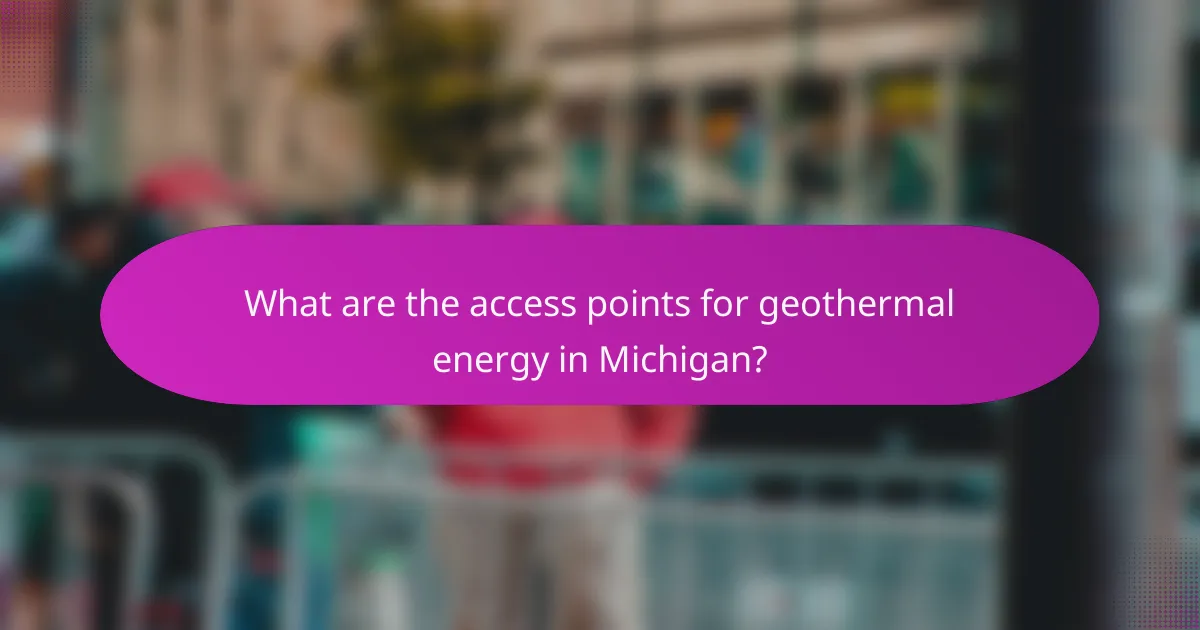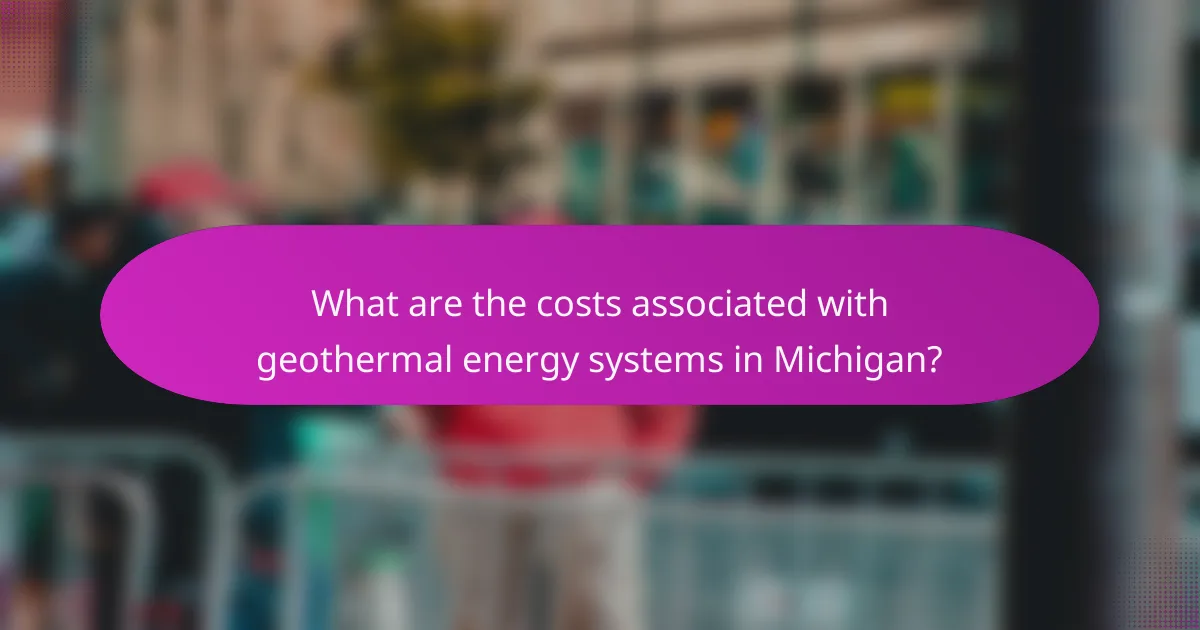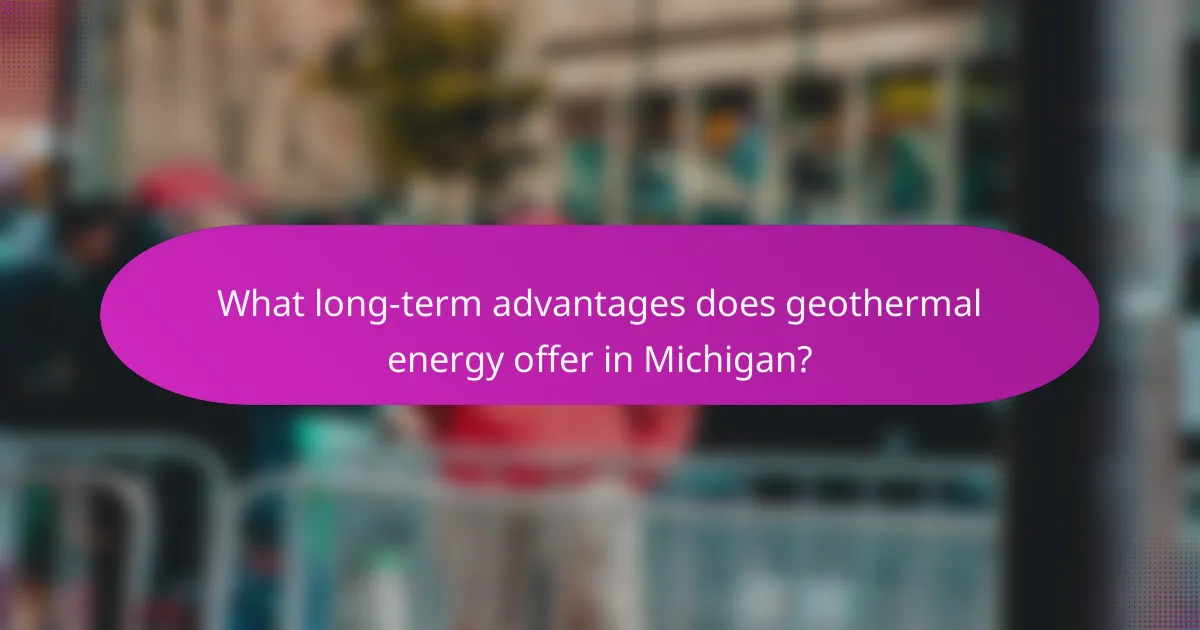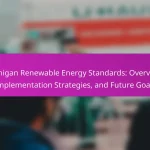
What are the geothermal energy opportunities in Michigan?
Michigan has significant geothermal energy opportunities. The state has abundant geothermal resources, primarily in the form of ground-source heat pumps. These systems can efficiently heat and cool buildings using the stable temperatures found underground. According to the Michigan Geothermal Energy Association, the potential for geothermal heating in Michigan could meet a substantial portion of the state’s energy needs. Furthermore, Michigan’s geological formations are favorable for geothermal energy extraction, particularly in the Lower Peninsula. The cost of installing geothermal systems has been decreasing, making it a more viable option for homeowners and businesses. Additionally, state incentives and federal tax credits support the adoption of geothermal technologies. These factors position Michigan as a promising state for expanding geothermal energy use.
How does geothermal energy work in the context of Michigan?
Geothermal energy in Michigan works by utilizing the Earth’s natural heat for heating and cooling systems. The state has significant geothermal potential due to its geological characteristics. Ground-source heat pumps extract heat from the ground during winter and transfer it to buildings. During summer, the process reverses, removing heat from buildings and transferring it back to the ground. Michigan’s climate allows for efficient geothermal systems, reducing energy costs significantly. According to the Michigan Geothermal Energy Association, these systems can lower heating costs by 30-70%. The state also has supportive policies promoting geothermal energy adoption, enhancing its viability as a renewable energy source.
What are the different types of geothermal energy systems available?
The different types of geothermal energy systems available are ground-source heat pumps, direct-use systems, and geothermal power plants. Ground-source heat pumps utilize the stable temperatures below the Earth’s surface to heat and cool buildings. Direct-use systems harness geothermal hot water directly for heating applications, such as in greenhouses or aquaculture. Geothermal power plants convert steam or hot water from the Earth into electricity. These systems capitalize on the Earth’s internal heat, providing sustainable energy solutions. According to the U.S. Department of Energy, geothermal energy can significantly reduce greenhouse gas emissions compared to fossil fuels.
How is geothermal energy harnessed in Michigan’s climate?
Geothermal energy in Michigan is harnessed through ground-source heat pumps. These systems utilize the relatively stable temperatures of the earth below the surface. In winter, heat is extracted from the ground and transferred indoors. In summer, the process is reversed, cooling buildings by transferring heat back into the ground. Michigan’s climate, with cold winters and warm summers, makes this system efficient. The average ground temperature remains around 50°F year-round, providing a reliable energy source. According to the U.S. Department of Energy, geothermal heat pumps can reduce heating and cooling costs by 30-60%. This efficiency is a significant advantage for Michigan residents.
What are the potential benefits of utilizing geothermal energy in Michigan?
Utilizing geothermal energy in Michigan offers multiple benefits. It provides a sustainable energy source that reduces reliance on fossil fuels. Geothermal systems have low operating costs once installed. They can significantly lower heating and cooling expenses for homeowners. Additionally, geothermal energy systems have a small carbon footprint. They contribute to local job creation in installation and maintenance. Michigan’s geological conditions are suitable for geothermal applications. This potential can lead to energy independence for the state.
How does geothermal energy contribute to environmental sustainability?
Geothermal energy contributes to environmental sustainability by providing a renewable source of energy with minimal greenhouse gas emissions. It harnesses heat from the Earth, reducing reliance on fossil fuels. This process results in lower air pollution compared to traditional energy sources. According to the U.S. Department of Energy, geothermal power plants emit 97% less carbon dioxide than coal-fired plants. Additionally, geothermal systems have a small land footprint, preserving natural habitats. Their use can enhance energy security and stability in energy prices. Overall, geothermal energy supports sustainable development goals by promoting clean energy solutions.
What economic advantages can geothermal energy provide for Michigan residents?
Geothermal energy can provide significant economic advantages for Michigan residents. It can reduce energy costs by utilizing a stable and renewable energy source. Residential geothermal systems can lower heating and cooling bills by up to 70%. This leads to long-term savings for homeowners. Additionally, geothermal energy systems require less maintenance than traditional heating systems, further reducing costs.
The installation of geothermal systems can create local jobs in the green energy sector. This contributes to the state’s economy and promotes sustainable practices. Geothermal energy also decreases reliance on imported fuels, enhancing energy security. By investing in geothermal energy, Michigan can attract investments and stimulate economic growth.

What are the access points for geothermal energy in Michigan?
Access points for geothermal energy in Michigan include residential geothermal heat pump systems, district heating systems, and direct-use applications. Residential systems utilize the ground’s stable temperature for efficient heating and cooling. These systems are prevalent in areas with suitable soil and rock conditions. District heating systems can harness geothermal resources to provide heat to multiple buildings. Direct-use applications involve using geothermal heat for agricultural processes or industrial applications. Michigan’s geology supports these access points, particularly in areas with significant geothermal potential.
Where can residents find geothermal energy resources in Michigan?
Residents can find geothermal energy resources in Michigan primarily through ground-source heat pump systems. These systems utilize the stable temperatures found in the ground to provide heating and cooling. Michigan’s geological conditions are suitable for geothermal energy, particularly in regions with clay and sand deposits.
The Michigan Department of Environment, Great Lakes, and Energy supports geothermal energy development. They provide resources and guidance for residents interested in installing geothermal systems. Additionally, various local contractors specialize in geothermal installations.
Research indicates that Michigan has a significant potential for geothermal energy, particularly for residential use. According to the U.S. Department of Energy, ground-source heat pumps can reduce energy costs by 30-70%. This makes geothermal systems a viable option for many Michigan residents seeking sustainable energy solutions.
What are the key regions in Michigan suitable for geothermal energy?
The key regions in Michigan suitable for geothermal energy include the southwestern and southeastern parts of the state. Areas such as Kalamazoo, Battle Creek, and Ann Arbor have favorable geological conditions. The geology in these regions allows for efficient heat extraction. Michigan’s average ground temperature is around 50°F to 60°F at a depth of 10 feet. This temperature range is ideal for geothermal systems. Additionally, the availability of aquifers enhances geothermal potential. The Michigan Department of Environment, Great Lakes, and Energy supports geothermal development in these areas.
How can homeowners assess their property’s geothermal potential?
Homeowners can assess their property’s geothermal potential by conducting a site evaluation. This involves analyzing the soil type and depth to bedrock. The presence of water sources nearby can also influence geothermal potential. Homeowners should consider the local climate and seasonal temperature variations. Additionally, they can consult with geothermal system professionals for a detailed assessment. Tools like geothermal potential maps and thermal conductivity tests can provide further insights. According to the U.S. Department of Energy, properties with stable ground temperatures between 45°F and 75°F are ideal for geothermal systems.
What are the common barriers to accessing geothermal energy in Michigan?
Common barriers to accessing geothermal energy in Michigan include high initial costs, regulatory challenges, and limited public awareness. The installation of geothermal systems often requires significant upfront investment, which can deter potential users. Additionally, navigating the regulatory landscape for permits and compliance can be complex and time-consuming. There is also a lack of information and understanding among the public regarding the benefits and feasibility of geothermal energy. These factors collectively hinder the widespread adoption of geothermal technology in the state.
How do regulatory frameworks impact geothermal energy access?
Regulatory frameworks significantly influence geothermal energy access. They establish the legal and procedural guidelines for exploration, development, and operation. These frameworks determine permitting processes, which can either facilitate or hinder project initiation. In Michigan, specific regulations dictate land use and resource management, impacting the feasibility of geothermal projects.
For instance, the Michigan Geothermal Energy Act provides a structure for permitting and licensing geothermal systems. This act aims to promote sustainable geothermal energy use while ensuring environmental protection. Additionally, regulatory incentives can encourage investment in geothermal technologies. States with supportive policies often see more geothermal projects and enhanced access to this energy source.
Therefore, strong regulatory frameworks can enhance geothermal energy access by streamlining processes and providing clear guidelines for stakeholders.
What financial challenges do residents face when considering geothermal systems?
Residents face significant financial challenges when considering geothermal systems. The initial installation costs can be prohibitively high, often exceeding $20,000. This upfront investment can deter many homeowners from pursuing geothermal energy. Additionally, financing options may be limited. Many residents may not qualify for loans or may face high-interest rates. The return on investment can take several years, sometimes over a decade, to realize savings on energy bills. Furthermore, the availability of incentives or rebates can vary widely by location. In Michigan, state and federal incentives may not cover the full cost. Therefore, residents must navigate these financial complexities when considering geothermal systems.

What are the costs associated with geothermal energy systems in Michigan?
The costs associated with geothermal energy systems in Michigan typically range from $10,000 to $30,000 for residential installations. This price includes drilling, equipment, and installation. The average cost per installed ton of geothermal capacity ranges from $2,500 to $5,000. Additionally, ongoing maintenance costs can be around $150 to $300 annually. Federal tax credits can offset up to 26% of installation costs, making it more affordable. According to the Michigan Geothermal Energy Association, these systems can lead to significant savings on energy bills over time.
What are the initial installation costs for geothermal systems?
Initial installation costs for geothermal systems typically range from $15,000 to $30,000. These costs can vary based on system type, property size, and installation complexity. Vertical systems tend to be more expensive than horizontal systems. Additionally, local soil conditions and drilling requirements impact pricing. According to the U.S. Department of Energy, geothermal systems can pay for themselves over time through energy savings. Federal and state incentives may further reduce upfront costs, making geothermal systems more accessible.
How do installation costs vary by system type in Michigan?
Installation costs for geothermal systems in Michigan vary significantly by system type. Closed-loop systems typically range from $20,000 to $30,000. Open-loop systems generally cost between $15,000 and $25,000. The installation complexity and the size of the property influence these costs. Additionally, horizontal systems tend to be less expensive than vertical systems. Vertical systems can exceed $30,000 due to deeper drilling requirements. Local incentives and tax credits can also affect the final installation cost. These variations are essential for homeowners to consider when evaluating geothermal energy options.
What factors influence the overall cost of geothermal energy systems?
The overall cost of geothermal energy systems is influenced by several factors. Key factors include initial installation costs, which can vary based on the type of system and site conditions. Drilling depth is another critical factor; deeper wells typically increase costs due to the need for specialized equipment. The type of geothermal system, whether closed-loop or open-loop, also affects pricing. Maintenance expenses contribute to the overall cost, as geothermal systems require regular checks and occasional repairs. Local regulations and permitting processes can introduce additional costs and delays. Finally, the availability of incentives and financing options can significantly impact the net cost for consumers.
What are the long-term financial implications of geothermal energy?
Geothermal energy has significant long-term financial implications. It offers lower operational costs compared to fossil fuels. The initial investment is high, but it leads to substantial savings over time. Geothermal systems typically have a lifespan of over 20 years. This longevity reduces the need for frequent replacements. Additionally, geothermal energy can provide stable energy prices. It is less susceptible to market fluctuations than conventional energy sources. According to the U.S. Department of Energy, geothermal energy can save homeowners up to 70% on heating costs. This financial advantage can lead to increased adoption and investment in geothermal systems.
How does geothermal energy affect utility bills over time?
Geothermal energy can significantly reduce utility bills over time. The initial installation costs are offset by lower monthly energy expenses. Geothermal systems typically provide heating and cooling at a fraction of the cost of traditional systems. According to the U.S. Department of Energy, homeowners can save 30-60% on heating and cooling costs. Over a 20-year period, these savings can accumulate to substantial amounts. Additionally, geothermal systems have low maintenance costs, further contributing to long-term savings. In Michigan, the efficiency of geothermal energy can lead to a rapid return on investment, enhancing financial benefits for homeowners.
What are the expected maintenance costs for geothermal systems?
The expected maintenance costs for geothermal systems typically range from $100 to $300 annually. These costs cover routine inspections and servicing of the system components. Regular maintenance is crucial for optimal performance and longevity. According to the U.S. Department of Energy, geothermal systems have lower maintenance needs compared to traditional heating systems. This is due to fewer moving parts and the durability of the ground loop system. Proper maintenance can prevent costly repairs and ensure efficiency. Overall, geothermal systems offer a cost-effective solution for heating and cooling needs.

What long-term advantages does geothermal energy offer in Michigan?
Geothermal energy offers several long-term advantages in Michigan. It provides a consistent and reliable energy source. Unlike solar or wind, geothermal energy is not dependent on weather conditions. This leads to stable energy costs over time. The use of geothermal energy can significantly reduce greenhouse gas emissions. In Michigan, this contributes to environmental sustainability goals. Additionally, geothermal systems have low operating and maintenance costs. They can enhance energy independence by reducing reliance on fossil fuels. Finally, the implementation of geothermal energy can stimulate local job creation in installation and maintenance sectors.
How does geothermal energy enhance energy security for Michigan?
Geothermal energy enhances energy security for Michigan by providing a stable and reliable energy source. It reduces reliance on imported fossil fuels. This local energy production can mitigate price volatility. Geothermal systems have low operational costs once established. According to the U.S. Department of Energy, geothermal energy can supply baseload power. This means it can operate continuously, unlike some renewable sources. Additionally, geothermal energy contributes to reducing greenhouse gas emissions. This aligns with Michigan’s goals for sustainable energy development.
What role does geothermal energy play in reducing reliance on fossil fuels?
Geothermal energy significantly reduces reliance on fossil fuels by providing a sustainable and renewable energy source. It harnesses heat from the Earth’s core, which can be used for electricity generation and direct heating applications. This process emits minimal greenhouse gases compared to fossil fuel combustion. According to the U.S. Department of Energy, geothermal energy can provide baseload power, meaning it can supply continuous energy regardless of weather conditions. In 2020, geothermal energy contributed to about 0.4% of total U.S. electricity generation. Transitioning to geothermal energy can help decrease carbon emissions and enhance energy security. This shift supports efforts to combat climate change and promotes a cleaner energy future.
How can geothermal energy contribute to job creation in Michigan?
Geothermal energy can significantly contribute to job creation in Michigan. The development of geothermal projects requires skilled labor for drilling, installation, and maintenance. This creates direct employment opportunities in engineering, construction, and technical support roles.
Additionally, geothermal energy initiatives can stimulate local economies. Increased demand for services, materials, and equipment leads to indirect job creation in related industries. For instance, local businesses may benefit from supplying geothermal systems and components.
Research indicates that transitioning to renewable energy sources like geothermal can generate thousands of jobs. A report by the U.S. Department of Energy estimates that geothermal energy development could create over 1,300 jobs in Michigan by 2030.
Overall, investing in geothermal energy not only supports environmental goals but also fosters economic growth through job creation.
What are the environmental benefits of long-term geothermal energy use?
Long-term geothermal energy use offers significant environmental benefits. It reduces greenhouse gas emissions compared to fossil fuels. Geothermal systems produce minimal air pollutants. They help decrease reliance on non-renewable energy sources. This contributes to energy sustainability and ecological preservation. Geothermal energy has a small land footprint, minimizing habitat disruption. It also promotes water conservation by using less water than traditional energy sources. According to the U.S. Department of Energy, geothermal energy can provide a stable and reliable power supply with low environmental impact.
How does geothermal energy impact local ecosystems?
Geothermal energy can impact local ecosystems in various ways. It primarily alters land use and water resources. The extraction process may lead to habitat disruption for local flora and fauna. Additionally, geothermal plants can affect groundwater temperatures and chemical composition. This can influence local species adapted to specific environmental conditions. Studies indicate that changes in soil moisture levels can also occur, affecting plant growth. Furthermore, emissions from geothermal operations can introduce pollutants into the air and water. These factors contribute to the overall ecological balance in the area.
What are the carbon footprint reductions associated with geothermal energy?
Geothermal energy significantly reduces carbon footprints. It emits about 90% less carbon dioxide than fossil fuels. This reduction occurs because geothermal systems utilize the Earth’s heat rather than burning fossil fuels. For instance, a study by the Geothermal Energy Association indicates that geothermal energy can offset approximately 25 million metric tons of carbon dioxide annually in the United States. Additionally, geothermal power plants produce minimal air pollutants compared to conventional energy sources. These factors contribute to cleaner air and a more sustainable energy future.
What practical steps can residents take to implement geothermal energy solutions?
Residents can implement geothermal energy solutions by assessing their property for geothermal potential. They should consult with a qualified geothermal contractor to evaluate site suitability. Installing a geothermal heat pump system is a crucial step. This system can provide heating and cooling efficiently. Residents may need to apply for permits based on local regulations. Financial incentives such as tax credits or rebates can help offset installation costs. Regular maintenance of the system ensures optimal performance and longevity. According to the U.S. Department of Energy, geothermal systems can reduce energy bills by 30-60%.
Geothermal energy opportunities in Michigan present significant potential for sustainable energy solutions, primarily through ground-source heat pumps. The article explores the mechanisms of geothermal energy, including its efficiency in heating and cooling, and highlights the state’s favorable geological conditions for energy extraction. It also addresses the costs associated with installation, available financial incentives, and the long-term economic and environmental benefits of adopting geothermal systems. Additionally, key regions suitable for geothermal energy access and common barriers to its implementation are discussed, providing a comprehensive overview of the geothermal landscape in Michigan.


